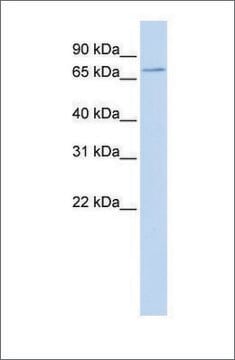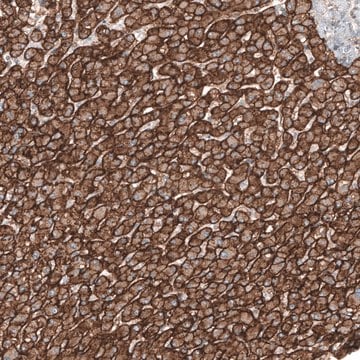ABC1453
Anti-Sodium-Iodine Symporter (NIS) C-term
from rabbit
Sinónimos:
Sodium/iodide cotransporter, Na(+)/I(-) cotransporter, NIS, Sodium-iodide symporter, Na(+)/I(-) symporter, Solute carrier family 5 member 5
About This Item
Productos recomendados
biological source
rabbit
Quality Level
antibody form
affinity isolated antibody
antibody product type
primary antibodies
clone
polyclonal
species reactivity
rat, mouse
technique(s)
immunocytochemistry: suitable
immunohistochemistry: suitable
immunoprecipitation (IP): suitable
western blot: suitable
isotype
IgG
NCBI accession no.
UniProt accession no.
shipped in
ambient
target post-translational modification
unmodified
Gene Information
rat ... Slc5A5(114613)
Categorías relacionadas
General description
Specificity
Immunogen
Application
Apoptosis & Cancer
Immunocytochemistry Analysis: A representative lot detected Sodium-Iodine Symporter (NIS) C-term in Immunocytochemistry applications (Levy, O., et. al. (1997). Proc Natl Acad Sci USA. 94(11):5568-73; De La Vieja, A., et. al. (2004). J Cell Sci. 117(Pt 5):677-87).
Immunohistochemistry Analysis: A representative lot detected Sodium-Iodine Symporter (NIS) C-term in rat thyroid, mammary gland from lactating rat (Tazebay, U.H., et. al. (2000). Nat Med. 6(8):871-8).
Western Blotting Analysis: A representative lot detected Sodium-Iodine Symporter (NIS) C-term in Western Blotting applications (Levy, O., et. al. (1997). Proc Natl Acad Sci USA. 94(11):5568-73; Tazebay, U.H., et. al. (2000). Nat Med. 6(8):871-8; Levy, O., et. al. (1998). J Biol Chem. 273(35):22657-63; De La Vieja, A., et. al. (2004). J Cell Sci. 117(Pt 5):677-87).
Immunoprecipitation Analysis: A representative lot detected Sodium-Iodine Symporter (NIS) C-term in Immunoprecipitation applications (De La Vieja, A., et. al. (2004). J Cell Sci. 117(Pt 5):677-87; Levy, O., et. al. (1998). J Biol Chem. 273(35):22657-63).
Quality
Western Blotting Analysis: 1.5 µg/mL of this antibody detected Sodium-Iodine Symporter (NIS) C-term in 10 µg of rat thyroid tissue lysate.
Target description
Physical form
Storage and Stability
Other Notes
Disclaimer
¿No encuentra el producto adecuado?
Pruebe nuestro Herramienta de selección de productos.
Storage Class
12 - Non Combustible Liquids
wgk_germany
WGK 1
flash_point_f
Not applicable
flash_point_c
Not applicable
Certificados de análisis (COA)
Busque Certificados de análisis (COA) introduciendo el número de lote del producto. Los números de lote se encuentran en la etiqueta del producto después de las palabras «Lot» o «Batch»
¿Ya tiene este producto?
Encuentre la documentación para los productos que ha comprado recientemente en la Biblioteca de documentos.
Nuestro equipo de científicos tiene experiencia en todas las áreas de investigación: Ciencias de la vida, Ciencia de los materiales, Síntesis química, Cromatografía, Analítica y muchas otras.
Póngase en contacto con el Servicio técnico








